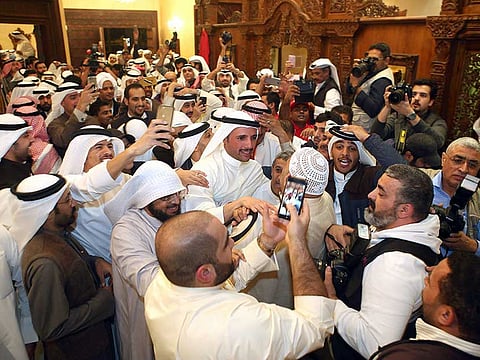Kuwait vote brings new faces
Following the latest parliamentary elections, all eyes are on cabinet formation and there is need for greater cooperation between the executive and legislature

In 2013, elections were held in Kuwait after the Constitutional Court upended the National Assembly. But some opposition blocs and figures boycotted the polls since amendments to the voting system had reduced the choice for voters. The new system reduced the field from four candidates out of ten in each of the five electoral districts to just one candidate. I had then penned a column, titled ‘Kuwaitis vote again for change’.
Over the last ten years I have, in numerous columns, written on what I have described as ‘The Kuwaiti malaise’. I have described Kuwait’s byzantine politics as a “lingering malaise that needs a major overhaul to overcome the endless, annoying and chronic feuds between the two branches of the political system. That call became even more urgent with the repeated suspension of the feisty and outspoken parliament, forcing Kuwaitis to go to the polls multiple times. Parliament was either suspended or upended by a court over irregularities and procedural errors. This, no doubt, has taken its toll on Kuwaiti voters”.
Kuwait was able to override the wave of Arab Spring and weather the socio-political storm due to the dynamics and free-wheeling mentality of Kuwaiti society and also because of the tolerant nature of the Kuwaiti leadership — channelled through formal representation and constitutional statutes and procedures, grounded in the unique relationship between the rulers and the ruled. In a recent interview, former speaker of the Kuwaiti parliament, Ahmad Al Sadoun, summed it up quite succinctly. On being asked what makes Kuwait unique in terms of democratic practices, he replied: “It is due to the fact that the ruling Al Sabah family has not made it to power by the force of the sword.”
For far too long, Kuwait has been a prototype and a harbinger of political representation in regional politics. Its soft power is worth emulating by other systems. But the endless feud between the executive and legislative branches of the political system has paralysed Kuwaiti politics for too long. This has resulted in the dissolution, by Emiri constitutional decrees, of eight elected parliaments, while the Constitutional Court dissolved two parliaments due to unconstitutional and faulty procedures. This has hampered Kuwait’s drive for modernisation and delayed mega-projects. Thus Kuwait has lagged behind other GCC states.
Legitimacy of the new electoral system
As the Economist has put it quite aptly in its recent issue: “Kuwait distinguishes itself in one respect — it is the closest thing to a democracy in the Gulf.” But Kuwait “has fallen behind countries like Qatar and the UAE in terms of dynamism and international appeal...”
A case in point being the fact that the last parliament in Kuwait, elected in July 2013, has not served its full term. The last parliament to have served a full term was in 2009-2013. Since then, seven parliaments have experienced dissolutions. Kuwaitis have been to the polls four times in less than five years. They have witnessed amendments to their electoral districts reduced from 25 to 5 in 2008 and a change in the electoral system from electing four candidates in every districts to just one — powered by an Emiri Decree in 2012.
Such a scenario has undoubtedly caused a lot of frustration among the people, leading to a boycott of parliamentary elections in December 2012 and July 2013. However, in the parliamentary election held most recently on November 26, the majority of the political groups and independent candidates, who had boycotted the previous elections, opted to participate, thereby acknowledging the legitimacy of the new electoral system.
On October 16, 2016, the Emir issued a decree upending the Kuwaiti parliament due to security challenges. This was the first such instance when regional and security challenges were cited as the reason behind dissolution of a sitting parliament. This came at a time when strife and wars, chaos, sectarianism and political wranglings over austerity measures and gradual withdrawal of subsidies on services and energy have dampened public sentiment.
It has been the season of change and youth. The current parliament is one of the youngest ever elected and with a highly educated group of parliamentarians — with more than 80 per cent of the 50 members being college graduates and some holding Masters and PhD degrees. Women, however, fared badly. Out of the 293 candidates in the field, only 15 women contested and just one won. The biggest losers were the Salafist Gathering. The biggest gainers were Islamic Constitutional Movement — winning four seats. The youth with reformist agenda also won big, now making up about 15 per cent of the parliament members.
Now all eyes are on the formation of the new cabinet, with the hope of the return of Prime Minister Shaikh Jaber Al Mubarak Al Sabah and greater cooperation between the legislative and executive branches of the administration to respect the verdict of the Kuwaiti electors.
Professor Abdullah Al Shayji is a professor of Political Science and the former chairman of the Political Science Department, Kuwait University. You can follow him on Twitter at www.twitter.com/@docshayji.


